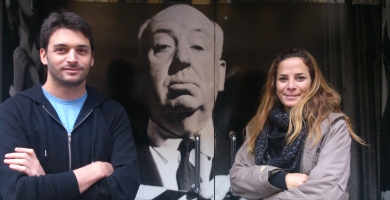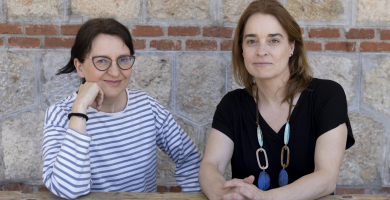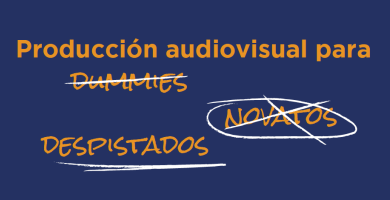
Bande à part: "The Film Commission has become essential for film schools"
This month we interview Sandra Navarro (Project Outreach & Festivals) and Uriel Wisnia (Project Development & Production) from the film school Bande à part.

- First of all, I would like you to explain in general terms what is Bande à part.
S: Bande à part is a film school based in Barcelona, where we teach national and international young people. We have about 250 students. They are trained to become filmmakers or to work in any position in the field of cinema. We have three different majors: film direction, direction of photography or editing, post-production and sound. Thus, each student has a very specific and focused training according to their preferences.
The teaching philosophy is based by Luis Aller and María José García, the directors, with more than 25 years of experience in the field of teaching and also with a huge film career.
Periodically we receive national and international visits of film directors and technicians, such as Andrei Ujica, Aki Kaurismäki, Abbas Kiarostami, Trueba, Javier Rebollo... In addition to the structured teacher training plan, we also bring an external view of consolidated and well-known professionals. Their speech is very interesting for our students, because they give them advice, experience and useful knowledges.
- One of the most important aspects of the school is learning by doing.
S: Yes. We really like the practices in the street... because it is the best way to learn how to shoot and how to produce a film. There, the students are eager to improve their skills by doing a series of exercises, most of them short films. But the practice always go together with theory.
The theory cannot be set aside. In his classes, the director Luis Aller makes a transversal overview of the history of cinema, but always making references to all cultural disciplines. It makes you question the film from different points of view, such as music, literature, art, history… So you can contextualize better and all possible levels can be analyzed.
This also makes you discover many other disciplines related to the cinema. It is a sort of Russian doll, where you will never stop discovering. As a viewer, you will not see the film in the same way. I will always remember a phrase that Aller told us the first day of class: "From now on you will never be the same innocent viewers, from today on you will see the film from behind."
- And the production company El dedo en el ojo, how does it work?
S: El dedo en el ojo is responsible for the distribution of the students’ work. Most of them are academic works, made during their stay in the school. There are very interesting works. Each year we receive a lot of short films and we analyse what chance have them in film festivals around the world.
We accompany the student's natural and logical progression, since its inception in school, with the production of their short film, until the jump of his career.
U: The production company is not understood without the school and vice versa. The main objective, as Sandra said, is to promote the work of the students, trying to give visibility to the projects, but always accompanying them in festivals. Now, we have also given a separate entity to El dedo en el ojo, because it is also responsible for another several productions, for example, projects from students who have already finished their studies in Bande à part... It is a bit like the F.C. Barcelona school.
- What do you think about the task of the Barcelona Film Commission in relation with your film school?
S: It is essential. The permits’ issues have always been very chaotic and very complicated. The Film Commission has the correct tools to coordinate and manage shootings.
It has happened many times, for example, that we finally had no option to carry out a shooting at a particular location and the Film Commission immediately offered us a similar space. For me, it dignifies the city. The Film Commission has become essential for film schools in Barcelona.
U: The relationship with the Film Commission is very fluent, both for the students’ productions and for the El dedo en el ojo’s projects. I am delighted. I think that the figure of a Film Commission is required in each city, it is essential. I have worked in several production companies, in advertising and television and they have always covered my specific needs. Their predisposition is excellent, I think there is no other way to run.
- As a film school, how many permits do you ask to the Film Commission?
U: In one year we manage about 25 large projects, with about 25 people per team. Each project has at least one permit and it is processed through the Film Commission, such as beaches, cemeteries, streets... In addition, we also have all the film school’s exercises. In these cases, we always ask for the general permission to film in the street. At least about 40 permits are annually expedited.
- As a film school, what do you think about the fact that Barcelona is a film friendly city?
S: I often ask the international students about why they have chosen this school, instead of another. Many times they answer me that the main reason is the city. I think that Barcelona has it all: it is a cosmopolitan city, it is open, it receives foreign people with open arms, it has sea and mountain... they can seem trivial issues, but basically if I had to decide where to study cinema now, I think it would be Barcelona, for sure. This city has all the main ingredients for this target. In addition, Barcelona is well prepared to receive all those people who want to shoot, because it has the necessary infrastructure.










